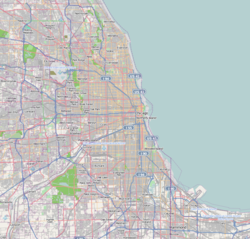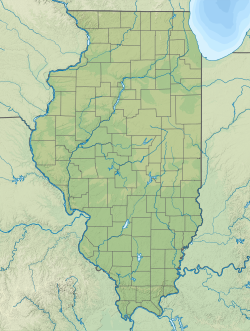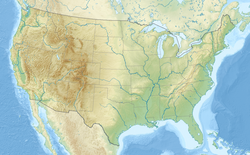Kenilworth is a village in Cook County, Illinois, United States, 15 miles (24 km) north of downtown Chicago. As of the 2020 census it had a population of 2,514. It is the newest of the nine suburban North Shore communities bordering Lake Michigan, and is one of those developed as a planned community.
Kenilworth, Illinois | |
|---|---|
 Location of Kenilworth in Cook County, Illinois. | |
| Coordinates: 42°5′17″N 87°42′57″W / 42.08806°N 87.71583°W | |
| Country | |
| State | Illinois |
| County | Cook |
| Township | New Trier |
| Incorporated | 1889 |
| Government | |
| • Type | Council–manager |
| • President | Cecily Kaz |
| Area | |
• Total | 0.61 sq mi (1.57 km2) |
| • Land | 0.61 sq mi (1.57 km2) |
| • Water | 0.00 sq mi (0.00 km2) 0% |
| Elevation | 615 ft (187 m) |
| Population (2020) | |
• Total | 2,514 |
| • Density | 4,141.68/sq mi (1,597.94/km2) |
| Up 0.8% from 2000 | |
| Standard of living (2007-11) | |
| • Per capita income | $104,301 |
| • Median home value | $1,000,000+ |
| ZIP code(s) | 60043 |
| Area code(s) | 847 & 224 |
| Geocode | 39519 |
| FIPS code | 17-39519 |
| Website | www |
In 2018, Kenilworth was the eighth wealthiest community in the United States, and the wealthiest in the Midwestern United States.[2] In December 2019, Forbes magazine listed Kenilworth village as the wealthiest zip code in the state of Illinois, with a median home sale price of $1,385,000 as of October 2019.[3] According to the United States Census Bureau, median household income exceeded an estimated $250,000 in 2022.[4]
History
editKenilworth was founded in 1889 when Joseph Sears purchased 223.6 acres of land consisting of several farms between the Chicago and North Western Railroad and Lake Michigan for $150,300. Sears and several of his associates formed The Kenilworth Company to execute his suburban dream.[5]
Sears founded the town on four principles: "Large lots, high standards of construction, no alleys, and sales to Caucasians only."[6] The Caucasians only provision intended the exclusion of all non-whites and Jews as well. Sears later used an informal poll to amend this provision so that live-in servants of color were allowed. This resulted in a population of 79 African Americans by 1950, all of whom worked as servants.[7] The impact has endured: as of 2020, just 10 African Americans lived in Kenilworth (0.4% of the population).[8]
The company undertook all marketing activities. They publicized the community's many attractive features through brochures, maps, and newspaper ads, as well as direct personal sales. Prospects were provided transportation from the city and greeted with a reception. Visitors were also offered overnight accommodations. In 1891, Sears invited about 20 of his personal friends, prominent bankers and Chicago businessmen to a picnic luncheon on Kenilworth's lake shore. Lots were offered at $60 an acre; significantly above the $15 an acre for similarly located property nearby. Some laughed, but the property did sell within 12 months.[9] This planned community attracted widespread attention and was visited by many noted architects attending the 1893 Columbian Exposition in Chicago.
On February 4, 1896, the village reached the required 300 residents and was incorporated. The elected board assumed municipal functions from Sears. The Kenilworth Company continued their sales activities until 1904, at which time Sears acquired the existing stock and became the sole owner of the remaining property.[10]
The Kenilworth Company coordinated every aspect of this planned community to ensure the highest quality implementation and adherence to Joseph Sears’ vision. The village layout was designed to take advantage of the natural features and beauty of the land. To maintain the country atmosphere, the plan required large lots and setbacks, tree plantings along roadways, and generous park lands. Mr. Sears donated much of his own property to achieve this goal.[11]
The church, schools, parks, clubs, and recreational areas were early additions to encourage a spirit of community. Noted architect Franklin Burnham joined The Kenilworth Company and designed the railroad station and the Kenilworth Union Church. Burnham also designed several homes for company members to display for potential residents.[12]
The first African American family to move to Kenilworth, the Calhouns, was met with resistance by many in the community, such as a cross burning in 1966 and racially charged vandalism, while others voiced shock over the offenses.[13] Speaking of his friends and neighbors, Walter Calhoun, a young student and athlete at the time, recalls "They bent over backwards to make sure I was never left out."[14] Four years after the shocking incident, two teenagers visited Harold Calhoun in his downtown office where they confessed and apologized for the cross burning.[14]
Geography
editAccording to the 2021 census gazetteer files, Kenilworth has a total area of 0.61 square miles (1.58 km2), all land.[15]
Demographics
edit| Census | Pop. | Note | %± |
|---|---|---|---|
| 1900 | 336 | — | |
| 1910 | 881 | 162.2% | |
| 1920 | 1,188 | 34.8% | |
| 1930 | 2,501 | 110.5% | |
| 1940 | 2,935 | 17.4% | |
| 1950 | 2,789 | −5.0% | |
| 1960 | 2,959 | 6.1% | |
| 1970 | 2,980 | 0.7% | |
| 1980 | 2,708 | −9.1% | |
| 1990 | 2,402 | −11.3% | |
| 2000 | 2,494 | 3.8% | |
| 2010 | 2,513 | 0.8% | |
| 2020 | 2,514 | 0.0% | |
| US Census Bureau | |||
As of the 2020 census[8] there were 2,514 people, 730 households, and 639 families residing in the village. The population density was 4,142 inhabitants per square mile (1,599/km2). There were 852 housing units at an average density of 1,404 per square mile (542/km2). The racial makeup of the village was 89.1% White, 0.4% African American, 0.2% Native American, 4.2% Asian, 0.6% from other races, and 5.5% from two or more races. Hispanic or Latino of any race were 4.1% of the population.
There were 730 households, out of which 43.4% had children under the age of 18 living with them. Among all households, 80.3% were married couples living together, 4.1% had a female householder with no husband present, and 12.5% were non-families. Households made up of one person living along account for 11.5% of the total, and 6.4% of households were one person, 65 years of age or older, living alone. The average household size was 3.44 and the average family size was 3.23.
The village's age distribution consisted of 33.0% under the age of 18, 7.5% from 18 to 24, 11.0% from 25 to 44, 34.4% from 45 to 64, and 14.1% who were 65 years of age or older. The median age was 43.5 years. For every 100 females, there were 102 males. For every 100 females age 18 and over, there were 92 males.
The median income for a household in the village was $241,591, and the median income for a family was $250,001. Males had a median income of $250,001 versus $58,214 for females. The per capita income for the village was $105,512. About 2.7% of families and 3.4% of the population were below the poverty line, including 1.2% of those under age 18 and 1.8% of those age 65 or over.
| Race / Ethnicity (NH = Non-Hispanic) | Pop 2000[16] | Pop 2010[17] | Pop 2020[18] | % 2000 | % 2010 | % 2020 |
|---|---|---|---|---|---|---|
| White alone (NH) | 2,398 | 2,412 | 2,207 | 96.15% | 95.98% | 87.79% |
| Black or African American alone (NH) | 4 | 7 | 8 | 0.16% | 0.28% | 0.32% |
| Native American or Alaska Native alone (NH) | 1 | 0 | 2 | 0.04% | 0.00% | 0.08% |
| Asian alone (NH) | 56 | 33 | 105 | 2.25% | 1.31% | 4.18% |
| Pacific Islander alone (NH) | 0 | 0 | 0 | 0.00% | 0.00% | 0.00% |
| Other race alone (NH) | 0 | 0 | 12 | 0.00% | 0.00% | 0.48% |
| Mixed race or Multiracial (NH) | 1 | 20 | 77 | 0.04% | 0.80% | 3.06% |
| Hispanic or Latino (any race) | 34 | 41 | 103 | 1.36% | 1.63% | 4.10% |
| Total | 2,494 | 2,513 | 2,514 | 100.00% | 100.00% | 100.00% |
Arts and culture
editNotable places and organizations in Kenilworth include:
- Kenilworth Fountain – In the middle of Kenilworth Avenue just east of the railroad tracks
- The Kenilworth Beach – The public beach on Lake Michigan, which is divided into a sailing beach and a bathing beach
- Pee Wee Field – Also known as "Sears Stadium" - Baseball field located on the west side of town where many little leaguers play
- Townley Field – District-owned sports field behind the school where many sports are played including field hockey, soccer, lacrosse, football, and the school Field Day
- The Ware Garden – Public courtyard on the east side where many residents walk their dogs
- Mahoney Park – A small park on the south side of town, named after the farm that was there at the town's founding
- Kenilworth Train Station – Train station on the Metra Line in between Indian Hill and Wilmette stations
- Joseph Sears School – Public elementary and junior high school on Abbotsford Road (JK-8)
- The Kenilworth Club – A frequented community house that hosts all sorts of events throughout the year
- Kenilworth Historical Society – Preserve and present the history of the town
- Kenilworth Union Church – A non-denominational Protestant church on Kenilworth Avenue
- Church of the Holy Comforter – Episcopal Church across the street from Kenilworth Union
- Hiram Baldwin House – A Prairie School house designed by Frank Lloyd Wright in 1905
Public services
editKenilworth does not have its own fire department. The town contracts with the neighboring Winnetka fire department. For library services, the Kenilworth Public Library District contracts with the Wilmette Public Library District. Kenilworth has its own police department, and 9-1-1 calls are handled by Glenview Public Safety Dispatch.
The Village of Kenilworth maintains a Public Works Department for maintenance of streets, trees, village-owned buildings, and traffic signals. Kenilworth is served by the Kenilworth Park District, which maintains parks and related facilities, and provides recreational programming.
Government
edit| Year | Republican | Democratic | Third Parties |
|---|---|---|---|
| 2020 | 34.22% 579 | 62.77% 1062 | 3.01% 51 |
| 2016 | 39.61% 604 | 51.74% 789 | 8.65% 132 |
| 2012 | 66.55 1,108 | 32.85% 547 | 0.60% 10 |
| 2008 | 55.27% 950 | 43.86% 754 | 0.87% 15 |
Education
editKenilworth has its own public school district, with its only school being Joseph Sears School, named after the founder of the village. The district is School District 38 in Cook County, and is the fifth most expensive K-8 district in the state of Illinois in per-student spending. The school, commonly known as Sears, runs from junior kindergarten through eighth grade, with about sixty students per grade.
Kenilworth is a part of New Trier Township High School District, which maintains campuses in the neighboring communities of Northfield (for freshmen) and Winnetka (for upperclassmen).
Transportation
editThe Kenilworth station provides Metra commuter rail service along the Union Pacific North Line. Trains travel south to Ogilvie Transportation Center in Chicago, and north to Kenosha station. Bus service in the village is provided by Pace.[20]
Notable people
edit- Frances Badger, painter and muralist, born in Kenilworth[21]
- Debra Cafaro, Chairman of the Board and Chief Executive Officer of Ventas, an S&P 500 company; a minority owner of the Pittsburgh Penguins[22]
- Julia Collins, 20-game Jeopardy! champion [23][unreliable source?]
- Robert Dold, Former Republican United States Congressman from 10th District of Illinois[24]
- Walker Evans, Depression era photographer[25]
- Paul Harvey, radio news commentator.
- Christopher George Kennedy, son of Robert F. Kennedy and Ethel Kennedy, and former president of the Merchandise Mart[26]
- Mark Kirk, Republican former United States Senator from Illinois[27]
- George Washington Maher, historically significant Chicago area architect[28]
- James McManus, poker player[29]
- Charles H. Percy, late and former Republican United States Senator from Illinois[30]
- Jude Reyes, billionaire, co-owner of Rosemont-based Reyes Holdings, Inc.[31]
- Liesel Pritzker Simmons, actress, millionaire, and philanthropist[32]
- Bradley Roland Will, activist, videographer and journalist; born in Evanston, was raised in Kenilworth
- Terence H. Winkless, film director[33]
References
edit- ^ "2020 U.S. Gazetteer Files". United States Census Bureau. Retrieved March 15, 2022.
- ^ "Where the Rich Are in the Midwest: 50 Richest Zip Codes". Bloomberg.com. Bloomberg. May 8, 2018. Retrieved April 3, 2019.
- ^ "The Most Expensive ZIP Codes in Every State". forbes.com. December 12, 2019. Retrieved August 5, 2024.
- ^ "Kenilworth village, Illinois". data.census.gov. Retrieved August 5, 2024.
- ^ Kilner, Colleen (1969). Joseph Sears and his Kenilworth. Kenilworth, IL: Kenilworth Historical Society. p. 138.
- ^ "Avoiding History at the National Trust | History News Network". historynewsnetwork.org. Retrieved February 28, 2023.
- ^ Loewen, James W. "Avoiding History at the National Trust".
- ^ a b "Explore Census Data". data.census.gov. Retrieved June 28, 2022.
- ^ Kenilworth - First Fifty Years. Kenilworth, IL: Village of Kenilworth. 1947. p. 8.
- ^ Kenilworth - First Fifty Years. Kenilworth, IL: Village of Kenilworth. 1947. p. 2.
- ^ Kenilworth - First Fifty Years. Kenilworth, IL: Village of Kenilworth. 1947. pp. 25, 33, 39.
- ^ Kilner, Colleen (1969). Joseph Sears and His Kenilworth. Kenilworth, IL: Kenilworth Historical Society. pp. 153–54.
- ^ "Residents voice shock over cross burning here". Wilmette News. May 26, 1966.
- ^ a b Marihugh, Holly (December 8, 2014). "Friendship & Forgiveness in Kenilworth". Daily North Shore. Retrieved January 5, 2017.
- ^ "Gazetteer Files". Census.gov. Retrieved June 29, 2022.
- ^ "P004: Hispanic or Latino, and Not Hispanic or Latino by Race – 2000: DEC Summary File 1 – Kenilworth village, Illinois". United States Census Bureau. Retrieved January 26, 2024.
- ^ "P2: Hispanic or Latino, and Not Hispanic or Latino by Race – 2010: DEC Redistricting Data (PL 94-171) – Kenilworth village, Illinois". United States Census Bureau. Retrieved January 26, 2024.
- ^ "P2: Hispanic or Latino, and Not Hispanic or Latino by Race – 2020: DEC Redistricting Data (PL 94-171) – Kenilworth village, Illinois". United States Census Bureau. Retrieved January 26, 2024.
- ^ "Election Results | Cook County Clerk".
- ^ "RTA System Map" (PDF). Retrieved January 31, 2024.
- ^ Schulman, Daniel. "Frances Badger". chicagomodern.org. Archived from the original on August 1, 2017. Retrieved December 3, 2016.
- ^ "$5.25M Kenilworth Home Designed by George Maher". Wilmette-Kenilworth, IL Patch. February 11, 2013. Retrieved June 14, 2018.
- ^ "Will The Streak Get Cracked?". thejeopardyfan.com (Blog). April 29, 2014.
- ^ Zawislak, Mick (September 12, 2009). "Kenilworth businessman to enter 10th Dist. Congressional race". Daily Herald.
- ^ "Oral history interview with Walker Evans, 1971 Oct. 13-Dec. 23". Archives of American Art. Smithsonian Institution. 1971.
- ^ "FEC Disclosure Image 28020220523". Federal Election Commission. March 3, 2008. Retrieved October 20, 2014.
- ^ Sweet, Lynn (July 23, 2010). "Mark Kirk and his near drowning story". Chicago Sun-Times. Archived from the original on February 9, 2013.
- ^ "George Washington Maher". Pleasant Home Foundation. Archived from the original on December 20, 2016. Retrieved October 20, 2014.
- ^ "From 'Bad Jim' in Las Vegas to 'geezer dad' in Kenilworth". Chicago Tribune. May 4, 2003.
- ^ "Newly disclosed account surfaces in 1966 Valerie Percy murder case". Chicago Tribune. June 14, 2011.
- ^ "Jude Reyes". Forbes.
- ^ Carlyle, Erin (November 17, 2013). "Liesel Pritzker Simmons Sued Her Family And Got $500 Million, But She's No Trust Fund Baby". Forbes.
- ^ "Terence H. Winkless". Internet Movie Database. Retrieved October 20, 2014.



